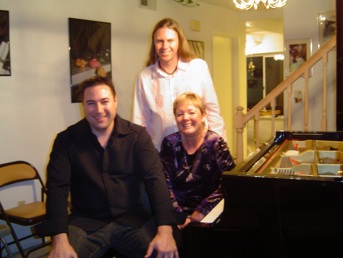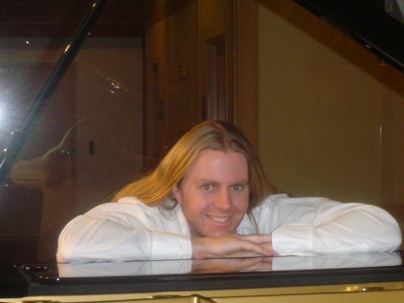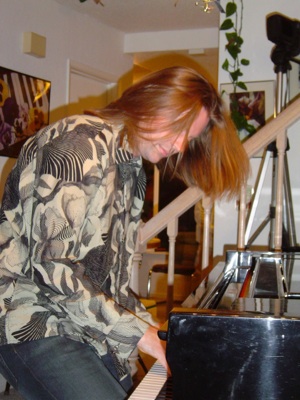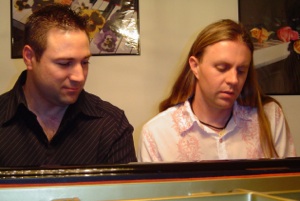I was introduced to Scott D. Davis’ music when he sent me his 2001 debut, “Piano and Woodwinds” for review. We met the first time when he performed at the Whisperings Solo Piano Radio concert at my home in 7/04, and I’ve had the pleasure of seeing him play live several times since then. He was on the bill with David Lanz and David Nevue earlier this year for a Whisperings concert in Vacaville, CA - a dream come true. He talks about that experience as well as many other aspects of his life and career in this interview, and I’m sure you’ll enjoy getting to know Scott. He will be performing a full concert at my home on October 7, 2006, and I know it’s going to be a lot of fun.
KP: When did you start playing the piano?
SD: When I was sixteen, I got a Casio with miniature keys for Christmas. Almost immediately, I got hooked on playing keyboard and making up little tunes in the same way that my friends were getting hooked on their Nintendo games. I really haven’t stopped since - I just have bigger and better keyboards!
KP: Did you do a lot of moving around as a kid?
SD: Yes. Both of my parents were in the Air Force. I was born in Germany, but we also lived in Great Britain, Panama, and Las Vegas for several years each. I went to high school in the Seattle area, and that’s where I fell in love with the outdoors and hiking. With Mt. Rainier so close, it was hard not to.
KP: How long have you lived near Sacramento (CA)?
SD: I’ve lived in this area for a little more than ten years, but have had the itch to move for a while. Lili and I are considering the Lake Tahoe area. Wherever we go, I want to be closer to the mountains. If we can be close to the ocean, too, it’s even better!
KP: Did you play guitar in some of the rock bands you were in?
SD: No, I’ve always been a keyboardist. I felt like I had to prove that keyboards could be as cool as guitar, so maybe that’s where some of my dexterity comes from - trying to out-solo the guitar players!
KP: Did you write music for the rock bands?
SD: Yes. I formed the first band I was in with friends in high school, and the guitarist and I wrote most of the music together. In the bands I joined after that, I was usually the main guy writing music. I never really wrote any lyrics, but the musical ideas were always flowing.
KP: Did you do a combination of original music and covers?
SD: Yes, but I have to admit that I did the covers reluctantly. That almost seemed like a necessary evil to get people interested enough to listen to the originals.
KP: Did you take piano lessons?
SD: When I was in college, I took a couple of semesters of a piano class, and then took a handful of lessons with the same teacher. When my parents moved to California, I moved with them and didn’t really pursue lessons after that.
KP: Do you read music?
SD: Yes, in terms of being able to read, write, and understand written music, but as far as being able to read and play - to sight-read - no, I don’t really do that too well. When I look at written music, I think about it too much. I can’t keep up with the music if I’m trying to play and read it at the same time. I lack the patience for it. Whenever I try to work on my sight-reading, I get ideas for new songs and usually end up following those threads, so I never really get around to practicing my sight-reading.
KP: Who or what are some of your musical influences?
SD: There’s a long and eclectic list of influences. My mom often listened to Rainbow, Deep Purple, and a lot of heavy metal bands from the ‘70’s, so I grew up listening to that. In the 80’s, I was a fan of the big hair heavy metal bands. I remember trying to build replica guitars out of my Leggo sets! I’d build a flying-V guitar and then put a record on and pretend I was in the rock band. I always wanted to do music, but it came as kind of a surprise that I ended up doing piano. In high school, I started exploring all different styles of music and really got into classical. I discovered that it’s not necessarily as stuffy and uncool as I thought, and I really got into Beethoven and Chopin. The guitarist for the first rock band I was in brought a David Lanz CD to one of our practices and loaned it to me. He thought I might like it, and boy, was he right!
KP: Which one was it?
SD: “Skyline Firedance.”
KP: That one knocked my socks off, too.
SD: “The Firedance” was probably the first track that really grabbed me. I listened to it over and over, trying to figure out how to play it by ear. At that point, I went looking for similar music and discovered George Winston as well. It was that music that got me thinking that maybe I could do something other than playing in a rock band. It was years later that I actually left my last band to do solo piano, but the seeds were definitely planted with the “Skyline Firedance” CD. It has a kind of rock energy to it, and I think that’s why it got my attention and started me thinking that solo piano music can actually be cool and not just something for the background.
KP: Are there any other musicians in your family?
SD: Not really. My mom played saxophone in high school and college, but by the time I came along, no one in my family was playing music. My dad actually claims to be tone deaf but I’m not sure I believe it. He’s definitely not much into music, but he always supported me in following my dreams. I always wanted to do music and he advised me to be sure to have a back-up plan. Being a musician is certainly not an easy way to make a living, and it’s probably the exception when someone can, but once I uncovered that passion when I got my first keyboard, I wanted to spend all of my time working on music. My homework might have suffered a little bit, but I knew that’s what I wanted to do.
KP: You were one of the first Whisperings artists. How did you find David Nevue, or did he find you?
SD: I think I found him when I ran across his music on on MP3.com in about 2001. He had started an early version of what Whisperings is now, and I asked if he would include me on the broadcast; he used a couple of my tracks. When MP3.com went away, we didn’t really keep in touch until I saw that the new Whisperings was starting up. I emailed David, and he remembered me, so I sent him my “Tahoma” CD. At that point, he was reluctant to include it - not because he didn’t like the music, but because he felt it was too energetic for the sound he was going for on Whisperings. It was “music to quiet your world,” and so much of my CD is upbeat and has a lot of energy. He eventually decided to include a couple of my songs, so that’s how my involvement started.
KP: How has Whisperings affected your career?
SD: Probably the most profound way it’s affected my career is being a part of this community of solo piano artists. We share information, resources, and ideas, and that has been tremendously helpful. We also listen to each other’s music, so it’s great to see what other pianists are doing and how they are doing it. Also, now when I travel around the country, I frequently stay with other Whisperings artists. We offer our guest bedrooms to each other when touring and doing performances, so it makes it less risky try to do a show somewhere far away. If you have someone to stay with, it makes you more willing to jump out there and try it.
David Nevue’s influence has been huge. He’s so good at marketing music independently - especially on the internet - and I’ve learned a lot from him. He has also set a high standard of quality for Whisperings artists. I know that if I want to have music from a new album included in the broadcast, it needs to meet a certain level of quality, and having the bar set high has definitely motivated me to strive for that.
KP: When did you start performing in shopping malls?
SD: In 2003, a friend moved her nature store to the local mall and wanted to do a grand reopening. She asked if I’d play in front of her store, and got permission for me to play there and sell CDs. I did it as a favor, thinking that playing in the mall didn’t sound all that cool, but it might be kind of fun for a day. I figured that if I was lucky, I might sell 10-15 CDs, but I sold about 80! I came home really thinking about this mall thing, that maybe it could be a lot more interesting than I thought at first! Within weeks, I was booking a tour of malls and I jumped in with both feet after that.
KP: Do the malls usually have piano stores?
SD: Not usually, so I have to convince a local piano dealer to provide a piano for me to use and advertise for them. Getting the pianos is actually the hardest part of the booking process, and if something is going to go wrong, it’s usually in getting the piano delivered on time.
KP: What role does nature play in your music?
SD: It’s a huge role. Most of the time, the inspiration for what I write comes from my experiences hiking or being out in nature. I find the modern world to be pretty distracting. Don’t get me wrong - I love it and take advantage of all of our modern conveniences - but there is something about getting out in the wilderness or being in nature that really seems to empty my mind of all the clutter and distractions, allowing the inspiration to come through clearly. Without that, I think my ideas would evaporate too quickly for me to actually turn them into music.
KP: What do you do when you get an idea for a new piece of music?
SD: I usually take staff paper and my plastic recorder with me when I’m hiking. The basic idea for a song is usually pretty simple - it might be a few notes for a melody or a pattern or something like that. When I get home, I can develop those ideas when I’m at the piano. The unique hook in a song will usually come to me when I’m hiking, so I have to have a way to get it down on paper. Otherwise it will probably disappear. There have probably been hundreds of songs that have come and gone because I failed to record them before they evaporated. Sometimes, the ideas come after I’m back from a trip but still on the high of the experience, so I usually go right to the piano when I get home from a hike. I’m in the habit of recording every practice session, even if I’m just sitting down to run through scales. I always hit the record button because I never know when some memory is going to pop into my head and lead to an idea. I might be working on something when the phone rings, and if I haven’t recorded it, it will be gone when I get back. I learned that lesson early on, so I record everything. The computer makes it pretty easy to do.

From left: Bill Walker, Scott, and Kathy after concert at Kathy’s 10/06.
KP: Do you record onto CD-ROMs?
SD: I record to the computer. With MIDI, you can speed it up or slow it down and figure out what it was that you just played. It takes up very little memory, so I can basically record forever. It also makes it really easy to copy and paste. If I’ve recorded a two-hour practice session, and there is a cool idea that came out in the middle of that session, I can just copy and paste that into another file so I don’t have to sift through an hour of scales or whatever I was working on when the idea came.
KP: Are you working on your next album yet?
SD: Yes. I’m working on two - an album of covers and a new album of original music. The covers album will be a tribute to Metallica - a whole album of solo piano arrangements of Metallica’s music. It will obviously be a very energetic album. To give balance to working on that, I intend for the album of originals be very mellow. Doing an all-mellow album is probably going to be the exception for me. High-energy music seems to come a little more naturally and it’s easier for me as a composer to make a song interesting if it’s upbeat or energetic. I’m excited about the challenge of figuring out how to keep quieter music interesting enough to listen to actively without getting bored. It can be a very elusive thing to compose slow, simple music that is still interesting. It’s very hard for me to resist putting in flourishes!
KP: Anyone who has seen you play live knows that! You mention on your website that you’re going to be doing more concerts with David Lanz. Do you have anything in the works?
SD: We have some possibilities, but nothing is booked yet. We have some venues in California in mind, and we’re going to talk about some other areas and see what comes of it. Nothing will happen until 2007, but probably early in the year. I feel like I’ve really improved as a performer since even that first Whisperings show at your house.
KP: Practice and experience help, and you’re playing for bigger and bigger audiences. You were really polished in Vacaville - and really good!
SD: I was very well-practiced for that show - and any show I do now. Playing in the malls helps. To play in that distracting environment, you have to really stay focused! This past weekend, I was set up not far from a Jamba Juice. They had blenders going the whole time! It’s definitely NOT an ideal concert venue, but it’s great advertising. The number of people who walk through a mall in a day is staggering. Only a small percentage stop and buy a CD, but it’s enough.
KP: It seems like you and David Lanz would be a good concert combination. You’re kind of different from each other, but not too different.
SD: From my perspective, David Lanz has been the biggest influence on me as a new age pianist. I can spot the trademarks of his influence all over my music even now, but I’m sure my more hard rock/hair band/heavy metal influence gets in there, too, and gives it a little different flavor.
KP: David can go in that direction, too, but he’s not as well-known for that.
SD: That’s what I know him for, though. My first CD of his was “Skyline Firedance,” and I’ve always thought of him as very energetic. It came as a surprise when I realized that most of his albums are pretty mellow.
KP: It seemed like you were kind of the hometown hero at the Vacaville (CA) Whisperings concert earlier this year. That must have felt good!
SD: It really did! That whole experience was just amazing and kind of surreal.
KP: Was that the first time you’d met David Lanz?
SD: The morning of the show was the first time we had met. It was fun because, on the inside, I was acting like a crazed fan. I didn’t act that way outwardly, but secretly I was doing the happy dance!
KP: The first time I met him, I couldn’t talk. I just kind of stammered! He’s so easy-going, there’s no reason to be nervous, but you don’t know that until you’ve talked to him for a while.
SD: Right. He says that when fans only know you through your music and the image that’s put out by your label, then they fill in all the gaps about you in their imaginations and build you up to be something larger than life. In reality, you’re still just a regular person.
KP: How many times have you donated your hair to Locks of Love?
SD: So far, just once. I did a benefit concert for them in 2002, and right before the last song of the show, I got my hair buzzed down to a crew cut onstage. I basically just had peach fuzz on my head for the last song.
KP: You couldn’t flip your hair back!
SD: Not at all, and it felt pretty weird. It messed me up playing the last song! I was used to dealing with all of that hair flying around, so it felt really strange!
KP: What’s up next for you?
SD: Well, I want to get at least one of the two albums done before the holidays this year. More than anything, I love performing in concerts and would like to make 2007 the year that I transition my mall gigs to actual concert dates. For me, that’s the dream come true, and doing concerts with David Lanz will help tremendously. If I can do concerts in the types of venues where I can share the music as well a little bit about who I am and the stories behind the music, that’s really the dream for me - to be able to not just do the music for myself, but to experience this process of other people getting some joy out of it. One of my favorite things is when somebody finds meaning in one of my songs or a song has a profound effect on a certain moment in someone’s life. It catches me by surprise what some of my songs mean to people and how powerful they can be. That’s what I enjoy the most - seeing the power of music in action. I believe in God, and I believe that the effect comes from outside of me, and really has very little to do with me. It’s about the expression of profound love going out into someone’s life. To actually see that in action is just incredible.
KP: How is “Rockfluence” doing?
SD: “Rockfluence” is doing really well, and almost instantly became my best-selling album. People know the cover songs, and that has a lot to do with it. Also, the majority of the songs that I chose for that album are songs that you would never imagine being done on piano. I felt it should be a surprise, so even the cover songs were sort of original. Songs like “Smells Like Teen Spirit” or Metallica or even “Hotel California” have probably never been done on piano. As a composer, it was a very interesting challenge to figure out how to take a song that was never intended for the piano and try to make it sound like it was.
KP: How did you pick the songs?
SD: I made a list of more than fifty of my favorite rock songs. I decided early on that at least with the first album of this concept, it would be good to stick to songs that were popular enough that a lot of people would have heard them. They still had to be songs that I love; otherwise, it would sound kind of fake. That narrowed it down a bit because some of my favorite songs are kind of obscure. I still had more than twenty songs, and I played around with them on the piano and tried different things. The ones that ended up on the album were the ones that took to the piano first. There were definitely some other songs that I wanted to do that didn’t come to life on the piano right away, so I put those on the shelf and may come back to them later on. If it sounds cheesy or like it’s forced on the piano, it ends up sounding like elevator music, and I definitely don’t want that! These are songs and bands that I really like, and I wanted my arrangements to show respect. Even though a song has already been written, when you’re arranging it for another instrument, there are still endless possibilities with what you can do with it. Considering how well “Rockfluence” is doing, I’m sure there will be sequels.
KP: Did you have much trouble getting the rights to record those songs?
SD: It’s not something that you really need permission for. You just have to notify the copyright owners in writing that you’re recording the song, and then be diligent about paying them standard royalties. Because they know you don’t really need their permission, if you ask for it, it’s pretty easy to get. In most cases, it was as easy as sending the publishers an email and them sending me a license form to sign. However, now I’m trying to release the sheet music for some of the songs, and that’s proving to be much more difficult. US copyright law doesn’t grant you the automatic right to release a sheet music arrangement of someone else's song. You can do a recording of your own performance of a song, but for anything else, you actually need permission.
KP: You’ve done two of your own songs in sheet music now. How are they doing?
SD: They’re doing well, and I’ll have two more songs available in a matter of weeks. I tend to sell a handful of them from my website each week, and I think that’s a good sign.
KP: Are you going to do “Soul of the Storm”?
SD: As sheet music? Oh yes! I plan to do the entire “Tahoma” album and, hopefully, at least a few tracks from “Rockfluence ” - the ones I can get permission for. I’m already getting requests for “Scherzo” in sheet music.
KP: That’s really a fun piece!
SD: When I started writing it, I was pretty much joking around and being silly, which is probably why it’s so fun.
KP: The first couple of times I listened to it, it made me laugh. Between “Soul of the Storm” and “Scherzo,” which is the most fun to play live?
SD: Oh boy! I don’t know if I can really choose which is more fun. “Scherzo” is definitely funnier, so I really enjoy the humor of it, but I think I probably enjoy playing “Soul of the Storm” a little bit more because it pacifies the rocker in me.
Many thanks to Scott D. Davis for sharing his story with us. To learn more about him and to hear samples of his music, visit
his website and check out his
Artist Page here on MainlyPiano.com.
Kathy Parsons
September 2006




